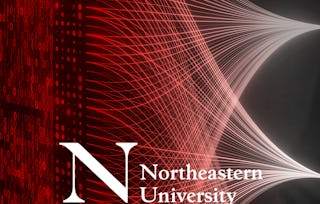This course delves into both the theoretical aspects and practical applications of data mining within the field of engineering. It provides a comprehensive review of the essential fundamentals and central concepts underpinning data mining. Additionally, it introduces pivotal data mining methodologies and offers a guide to executing these techniques through various algorithms. Students will be introduced to a range of data mining techniques, such as data preprocessing, the extraction of association rules, classification, prediction, clustering, and the exploration of complex data, and will implement a capstone project exploring the same. Additionally, we will use case studies to explore the application of data mining across diverse sectors, including but not limited to manufacturing, healthcare, medicine, business, and various service industries.

Practical Engineering Data Mining: Techniques and Uses

Skills you'll gain
- Unsupervised Learning
- Data Analysis
- Data-Driven Decision-Making
- Exploratory Data Analysis
- Data Mining
- Statistical Analysis
- Model Evaluation
- Dimensionality Reduction
- Data Cleansing
- Big Data
- Applied Machine Learning
- Data Transformation
- Predictive Analytics
- Forecasting
- Data Preprocessing
- Regression Analysis
- Data Visualization Software
- Classification Algorithms
- Skills section collapsed. Showing 10 of 18 skills.
Details to know

Add to your LinkedIn profile
5 assignments
See how employees at top companies are mastering in-demand skills

There are 4 modules in this course
In this module, participants will explore essential data concepts across domains, understanding diverse data types, attributes, and features. They will grasp the fundamental principles, methodologies, and scope of data mining, enabling them to effectively analyze data and extract valuable insights. Through this comprehensive approach, learners will gain proficiency in utilizing key data concepts, facilitating informed decision-making and innovation across various domains.
What's included
5 videos8 readings2 assignments2 discussion prompts
This module aims to impart a comprehensive understanding of data concepts, spanning various domains. Participants will learn to differentiate between different data types, attributes, and features. They will explore fundamental principles and methodologies of data mining, enabling them to extract meaningful insights from datasets. By mastering these objectives, learners will be equipped with the knowledge and skills necessary to analyze data effectively and make informed decisions in diverse professional settings.
What's included
3 videos13 readings1 assignment1 discussion prompt
Throughout this module, we will jump into the realm of dimensionality reduction, a technique for simplifying complex datasets to facilitate efficient analysis and visualization. By implementing dimensionality reduction methods such as Principal Component Analysis (PCA) and t-Distributed Stochastic Neighbor Embedding (t-SNE), we will gain insight into how to effectively reduce the number of features while preserving essential information. We'll learn to select and apply the most suitable dimensionality reduction techniques based on data types and analytical goals, thereby enhancing model performance and interpretability. This module shares the tools to navigate and extract meaningful insights from high-dimensional datasets, paving the way for more effective data analysis and decision-making.
What's included
4 videos9 readings1 assignment1 discussion prompt
In this module, we learn the concept of the Bias-Variance Trade-off in machine learning. Striving for models that generalize well requires navigating the delicate balance between bias and variance to avoid underfitting and overfitting. Bias represents the error from oversimplifying a complex problem, while variance quantifies the model's sensitivity to different training data subsets. We explore strategies to combat bias and variance in developing models that strike the right balance between accuracy and generalization. Transitioning to regression metrics, we look at practical tools used to measure and evaluate model performance in regression tasks, focusing on metrics like Root Mean Squared Error (RMSE). Finally, we navigate the landscape of assessing model performance in binary classification tasks, exploring advanced measures like the F1-Score, Matthews Correlation Coefficient (MCC), propensity scores, and the AUC-ROC curve.
What's included
5 videos10 readings1 assignment1 discussion prompt
Instructor

Offered by
Explore more from Data Analysis
 Status: Preview
Status: PreviewNortheastern University
 Status: Preview
Status: PreviewNortheastern University
 Status: Preview
Status: PreviewNortheastern University
 Status: Preview
Status: PreviewNortheastern University
Why people choose Coursera for their career

Felipe M.

Jennifer J.

Larry W.

Chaitanya A.

Open new doors with Coursera Plus
Unlimited access to 10,000+ world-class courses, hands-on projects, and job-ready certificate programs - all included in your subscription
Advance your career with an online degree
Earn a degree from world-class universities - 100% online
Join over 3,400 global companies that choose Coursera for Business
Upskill your employees to excel in the digital economy
Frequently asked questions
To access the course materials, assignments and to earn a Certificate, you will need to purchase the Certificate experience when you enroll in a course. You can try a Free Trial instead, or apply for Financial Aid. The course may offer 'Full Course, No Certificate' instead. This option lets you see all course materials, submit required assessments, and get a final grade. This also means that you will not be able to purchase a Certificate experience.
When you purchase a Certificate you get access to all course materials, including graded assignments. Upon completing the course, your electronic Certificate will be added to your Accomplishments page - from there, you can print your Certificate or add it to your LinkedIn profile.
Yes. In select learning programs, you can apply for financial aid or a scholarship if you can’t afford the enrollment fee. If fin aid or scholarship is available for your learning program selection, you’ll find a link to apply on the description page.
More questions
Financial aid available,

